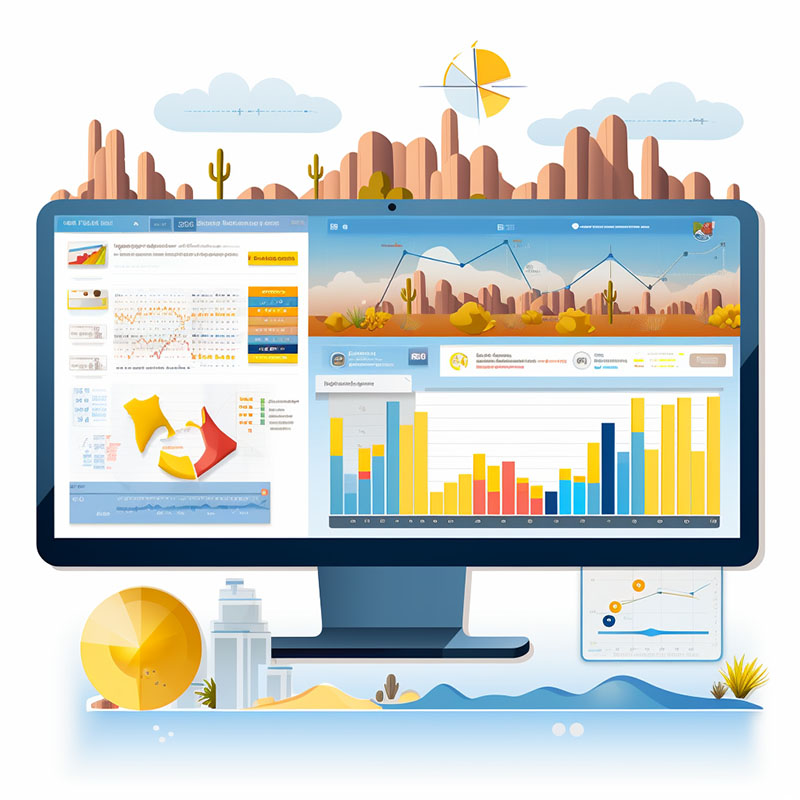Businesses have a lot of competition in Metro Phoenix! Just having a website isn’t enough; it’s the foundation of your online efforts, just as your storefront is the foundation of your offline advertising. You have to market your website just as you have to market your business. That’s why local SEO in Phoenix is so vital to online success.
However, SEO isn’t easy in Phoenix’s highly competitive economic environment. The Valley is huge, and it’s filled with businesses that are competing aggressively for the same SEO keywords you are. It takes a lot of work to rank locally in Google.
So, where do you start? With this quick guide to local SEO in Phoenix!
Optimizing Your Website
Your website is your digital storefront. It doesn’t just represent your business online, it IS your business online. It serves as the foundation for all of your local SEO efforts.
This is why optimizing your website for both search engines and users is so vital. Everything else hinges on how well your site functions.
So, how do you optimize your website for local SEO?
It all Begins with Content
SEO professionals often argue about whether content is the primary ranking factor for a website. We believe it is, and we can prove it: without content, there’s nothing to rank. Period.
So, when it comes to improving local SEO in Phoenix, your website’s content is the most important consideration. It’s links to your content that will help improve rankings and traffic.
But content isn’t just about SEO. Getting traffic is only half the battle; you have to convince them to take action after they arrive. And you don’t have very long to do that.
The text and media on your site must capture the visitor’s attention quickly and guide them seamlessly through the sales funnel. This means content that answers questions directly and quickly. It also means make it easier for visitors to read, scan, and navigate.
Avoid Keyword Stuffing
Years back, webmasters discovered they could make websites ranking by stuffing pages with the keywords they wanted to rank for. It worked for a short while, but the tactic led to poor user experiences. Google caught on to this and began penalizing websites for keyword stuffing.
Using keywords requires a balance. They need to be included, but not excessively. A better strategy is to use keywords naturally and cover relevant topics regularly (and deeply). That way, you’re still targeting relevant keywords while also providing a great user experience for potential customers.
Include Images
Pictures and graphics are great for both maintaining the attention of visitors and improving SEO. They offer the opportunity to appear in image results and improve your site’s overall relevance.
Of course, it’s not enough to simply add images to your website. You’ll have to ensure they’re optimized, too. Here’s how:
- Include alt text to describe your image
- Use captions when appropriate
- Compress large images so they load more quickly
- Ensure images are contextual with your page’s text
As with keywords, don’t add tons of images to your site just to rank them. It won’t work and the user experience may suffer. Instead, use them to enhance your website’s message.
Local Nuances
Search engines (especially Google) have gotten very good at understanding semantics. This is especially important when trying to rank locally in Phoenix. So how does this work?
Consider the fact that Metro Phoenix is often called “the Valley.” And, its eastern suburbs are dubbed “the East Valley.” Search engines understand these local nuances.
Use these nicknames and local nuances to help improve your website’s rankings. Even better, find clever ways to specifically tie the products or services you offer to your local area. For example, if you own a local outdoor recreation shop, use a local trail as the location for a product review. If you’re a lawyer, write blog posts about local ordinances and why they were specifically passed in the area you serve.
We are fortunate enough to live in a very unique area. Specifying local nuances is easier when you live in a place unlike most others. Depending on your industry, you may be able to tie our desert environment into your content to help improve search engine rankings.
However, local nuances (along with all keywords) require a balance. You want to use them naturally. Avoid overusing local nuances just to help improve your rankings.
Join Local Clubs and Organizations
The more you can do to show your business’s involvement in the Phoenix area, the better. One great first step is to join the Chamber of Commerce. This will show involvement in a highly relevant local directory. It will also usually result in a valuable backlink.
Beyond that, see how local businesses make their presence known in the Phoenix area. Are they part of an association? Is there an association that relates specifically to your business and the Valley? If not, could you create one?
Google Business Profile
Google Business Profiles are one of the most important (and most ignored) tools for local SEO rankings in Phoenix. They really do serve as the introduction to your business in search engines.
Setting up your Google Business Profile is vital, but that’s still not enough; you have to maintain your Profile as well. This means:
- Posting regularly
- Adding images of your products and services
- Properly entering products and services with descriptions
- Responding to reviews and questions
- Updating business information as soon as it changes
Very few businesses properly set up and maintain their Google Business Profile. This means those that do will have an excellent advantage in gaining search engine rankings.





